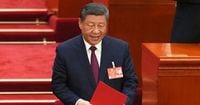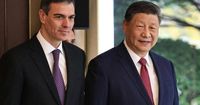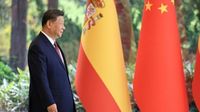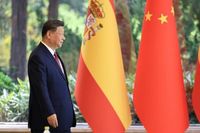On Friday, April 11, 2025, Chinese President Xi Jinping made a significant appeal to the European Union (EU), urging it to unite against the "intimidation" posed by the United States amid an ongoing tariff offensive. This call came during a meeting in Beijing with Spanish Prime Minister Pedro Sánchez, where Xi emphasized the importance of cooperation between the two powers in the face of the trade war initiated by former President Donald Trump.
"China and the EU must assume their international responsibilities, jointly protect economic globalization, and resist any unilateral harassment," Xi stated, highlighting the need for a collaborative approach to safeguard mutual interests and ensure fairness in international relations.
In a subsequent press conference, Sánchez, who advocates for closer ties between Brussels and Beijing, argued that the current trade tensions should not hinder the development of cooperation between China, Spain, and the EU. "Both Spain and Europe have a significant trade deficit with China that we need to address," he remarked. "But we must not allow trade tensions to interfere with the potential growth of our relationship, both between China and Spain and between China and the EU."
Currently, Spain imports Chinese products worth €45 billion (approximately $49.1 billion), while its exports to China stand at only €7.4 billion. Sánchez's visit marks his third trip to China in just over two years, as he seeks to boost exports and attract investments that create "value-added" and "high-quality jobs."
During his previous visit to Beijing in September, Sánchez had distanced himself from the EU's stance on imposing high tariffs on Chinese electric cars. The EU argued that such tariffs were necessary to protect European manufacturers from unfair competition, particularly from state-supported Chinese companies. In response, China initiated an investigation into EU pork imports, a sensitive issue for Spain, which is the largest exporter of pork products to China within Europe.
Sánchez announced that he had signed a protocol aimed at expanding access for Spanish pork products to the Chinese market, a move seen as beneficial for Spanish agricultural interests.
The recent visit has drawn criticism from Spain's right-wing factions and conservative media, who express concerns about a growing alignment with China and argue that Sánchez is not fully aligned with the EU. U.S. Treasury Secretary Scott Bessent cautioned Spanish leaders this week, warning that a closer relationship with China could be detrimental, stating, "Aligning more with China would be like cutting your own throat."
As the geopolitical landscape shifts, Xi's call for unity with the EU comes at a time when the U.S. maintains a hardline stance on trade. The U.S. has imposed a range of tariffs, including a staggering 145% surcharge on Chinese goods, which has exacerbated tensions and led to volatility in global markets.
In the wake of these developments, French President Emmanuel Macron also weighed in, describing the reduction of U.S. tariffs to 10% as a "fragile pause" and emphasizing the need for Europe to remain strong and unified in its responses to U.S. policies.
Market reactions have been mixed, with significant declines in Asian markets following U.S. trading patterns. The Tokyo index fell by 3.37%, while the Seoul index lost 0.64%. Wall Street also experienced sharp declines, with the Dow Jones dropping 2.50% and the Nasdaq index falling by 4.31%. However, the Shanghai index managed to rise by 0.75%, indicating some resilience in the Chinese market.
In Europe, futures for the CAC 40 in Paris were up 1.06%, with other major indices such as Frankfurt, London, and Milan also showing slight gains. This uptick followed Trump's announcement of a 90-day freeze on punitive tariffs imposed on 60 trading partners, aimed at facilitating negotiations with Washington.
Despite this temporary reprieve, the U.S. continues to enforce minimum tariffs of 10% and surcharges of 25% on steel, aluminum, and automobiles. The EU has suspended its countermeasures for now, a move that Trump described as "very smart." Ursula von der Leyen, the President of the European Commission, has threatened to impose taxes on large U.S. technology companies if negotiations fail, indicating the potential for escalating trade tensions.
As the situation unfolds, the Chinese Ministry of Commerce has reiterated that any dialogue must be conducted on equal footing and based on mutual respect. The backdrop of these discussions is further complicated by the U.S. administration's view of China as responsible for a public health crisis related to opioids in the United States.
The upcoming week will see Xi Jinping travel to Southeast Asia, visiting Vietnam, Malaysia, and Cambodia, further emphasizing China's efforts to strengthen ties in the region amid the ongoing trade war with the U.S. This trip, scheduled from April 14 to April 18, comes at a critical time as the U.S. continues to impose tariffs that have affected these nations significantly.
The trade war initiated by Trump has not only influenced U.S.-China relations but has also reverberated across global markets, affecting economies worldwide. As nations grapple with the implications of these tariffs, the call for cooperation and resistance to unilateral actions becomes increasingly vital.







